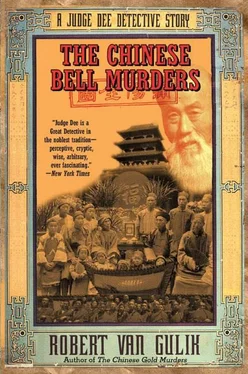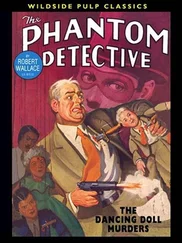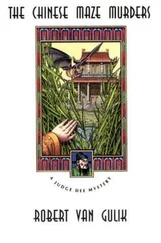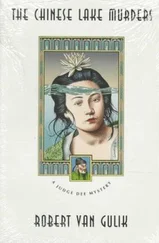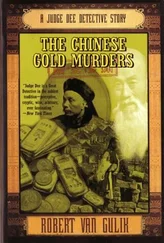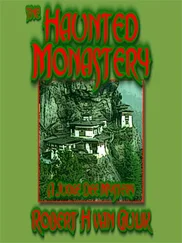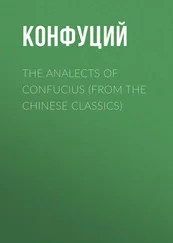'There is one string of copper cash short! Explain where that money went to.'
The headman hemmed and hawed but could produce no plausible explanation of the difference.
'That sum will be deducted from your salary,' Judge Dee announced curtly.
He leaned back in the arm-chair. Sipping the tea that Sergeant Hoong had offered him Judge Dee waited to see whether anyone in the audience wished to present a complaint. When none was forthcoming he raised his gavel and closed the session.
When Judge Dee had left the dais for his private office the crowd started to voice its disappointment.
'Get going!' shouted the constables. 'You people have seen what you came to see, hurry up now and don't keep us constables from our official duties!'
After the court hall had been cleared the headman spat on the floor and sadly shook his head. He said to some younger constables standing about there:
'You young ones had better look for another job! In this accursed tribunal of Poo-yang you will never make a decent living. Look, for the last three years we have been serving under His Excellency Feng, who asked an explanation for every missing silver piece. I thought that I had had my full share of service under a scrupulous magistrate! But now His Excellency Dee has succeeded him and he, may August Heaven preserve us, frowns on one string of copper cash! What a terrible state of affairs for us constables! Now tell me, why is it that easy-going and corrupt magistrates always shun Poo-yang?'
While the constables were muttering, Judge Dee was changing into a comfortable informal robe, assisted by a lean man, clad in a simple blue dress with a brown sash. He had a long, saturnine face, with a mole the size of a copper cash on his left cheek, from which sprouted three black hairs several inches long.
This was Tao Gan, one of Judge Dee's trusted lieutenants. Until a few years before he had earned a precarious living as a confidence man and he was therefore thoroughly familiar with loading dice, drawing up ambiguous contracts, forging seals and signatures, picking locks and all other tricks of city crooks. Once Judge Dee had extricated him from a nasty situation, and since then Tao Gan had reformed. He served Judge Dee with unswerving loyalty. His alert mind and his talent for spotting unsavoury affairs had proved useful to the judge in solving more than one criminal case.
When Judge Dee had seated himself behind his desk two burly fellows entered and respectfully greeted him. Both were clad in long brown robes, girded with a black sash. They wore small, black pointed caps. These were Ma Joong and Chiao Tai, Judge Dee's other two lieutenants.
Ma Joong was well over six feet tall with 'shoulders like a bear.' His large, heavy-jowled face was clean-shaven except for a short moustache. Notwithstanding his great bulk, he moved with the swift grace that marks the experienced boxer. In his younger days he had served as bodyguard to a corrupt official. Once when his master extorted money from a widow, Ma Joong rose against him and almost killed him. Naturally he had to flee for his life so he joined the 'brothers of the green woods,' that is to say he became a highwayman. Once he attacked Judge Dee and his suite on the road outside the capital, but was so impressed by Judge Dee's personality that he gave up his profession then and there to become a devoted servant of the judge. Because of his great courage and remarkable strength, Judge Dee always employed him for arresting dangerous criminals and other risky undertakings.
Chiao Tai was a colleague of Ma Joong from his days in 'the green woods.' Though not as formidable a boxer as Ma Joong, he was an expert archer and skilful swordsman, and moreover possessed that dogged patience which is such an asset in the detection of crimes.
'Well, my braves,' Judge Dee said, 'I take it that you have had a look around in the city of Poo-yang and have an impression of the state of affairs.'
'Your Honour,' Ma Joong replied, 'His Excellency Feng must have been a good magistrate. People here are prosperous and content. The inns serve tasty food at reasonable prices and the local wine is delicious. It seems that we shall have an easy-time here!'
Chiao Tai assented happily, but Tao Gan had a doubtful look on his long face. He said nothing, but slowly let the long hairs of the mole on his cheek slip through his fingers, judge Dee glanced at him.
'Are you of a different opinion, Tao Gan?' he enquired.
'As a matter of fact, Your Honour,' began Tao Gan, 'I chanced upon something that would seem to invite a thorough investigation.
'Making the rounds of the larger te-a houses of this city, by force of habit I tried to find out about the sources of wealth of this district. I soon discovered that although there are about a dozen very wealthy merchants who handle the canal traffic, and four or five big landowners, their riches are a mere trifle when compared with the wealth of Spiritual Virtue, the abbot of the Temple of Boundless Mercy, in the northern suburb of the city. He is the head of that vast, newly-built temple compound and has about sixty baldpates under him. However, instead of fasting and praying those monks spend their time drinking wine, eating meat, and in general live off the fat of the land.'
'Personally,' Judge Dee interrupted, 'I will have no truck with the Buddhist crowd. I find myself completely satisfied with the wise teachings of our peerless Sage Confucius and his venerable disciples. I don't feel the need for meddling with the doctrines introduced by the black-robed foreigners from India. Our Imperial Court, however, in its august wisdom, has deemed that the Buddhist creed serves a purpose inasmuch as it ameliorates the morals of the common people and therefore has extended its gracious protection to the Buddhist clergy and their temples. If they flourish, then this is in accordance with the Imperial Will and we must carefully refrain from criticism!'
Tao Gan, thus admonished, still seemed reluctant to leave the subject.
'When I say that the abbot is rich, Your Honour,' he continued after some hesitation, 'I mean to say that he must be as rich as the God of Wealth himself! They say that the monks' quarters are appointed as luxuriously as a Prince's palace. The sacrificial vessels on the altar in the main hall are all of pure, solid gold, and ----'
'Spare me,' Judge Dee exclaimed, cutting his lieutenant short, 'all those details, which, moreover, are only based on hearsay. Come to your point!' Tao Gan then said:
'Your Honour, I may be wrong, but I have a strong suspicion that the wealth of that temple is derived from a particularly sordid scheme.'
'Now,' Judge Dee remarked, 'your conversation begins to interest me. Proceed, but be brief!'
'It is widely known,' Tao Gan went on, 'that the main source of income of the Temple of Boundless Mercy is the large statue of the Goddess Kwan Yin which stands in the main hall. It is carved from sandalwood and must be well over a century old. Until some years ago it stood in a tumbledown hall surrounded by a neglected garden. The temple was inhabited by three monks who lived in a nearby shack. Only few people came to the temple to pray, and the incense fee they left was not enough to guarantee the three monks their daily bowl of watery rice. So every day they walked the streets with their alms-bowl in order to supplement their meagre income.
'Then, five years ago, a vagrant monk settled down in the temple. Although clad in rags, he was a tall, handsome man of imposing mien. He called himself "Spiritual Virtue." About a year later the word spread that the sandalwood statue of the goddess had miraculous power and that childless couples who prayed at the temple always produced offspring. Spiritual Virtue, who by then had proclaimed himself abbot of the temple, always insisted that the women who desired a child must pass one night in pious meditation on a couch in the main hall directly in front of the statue.'
Читать дальше
